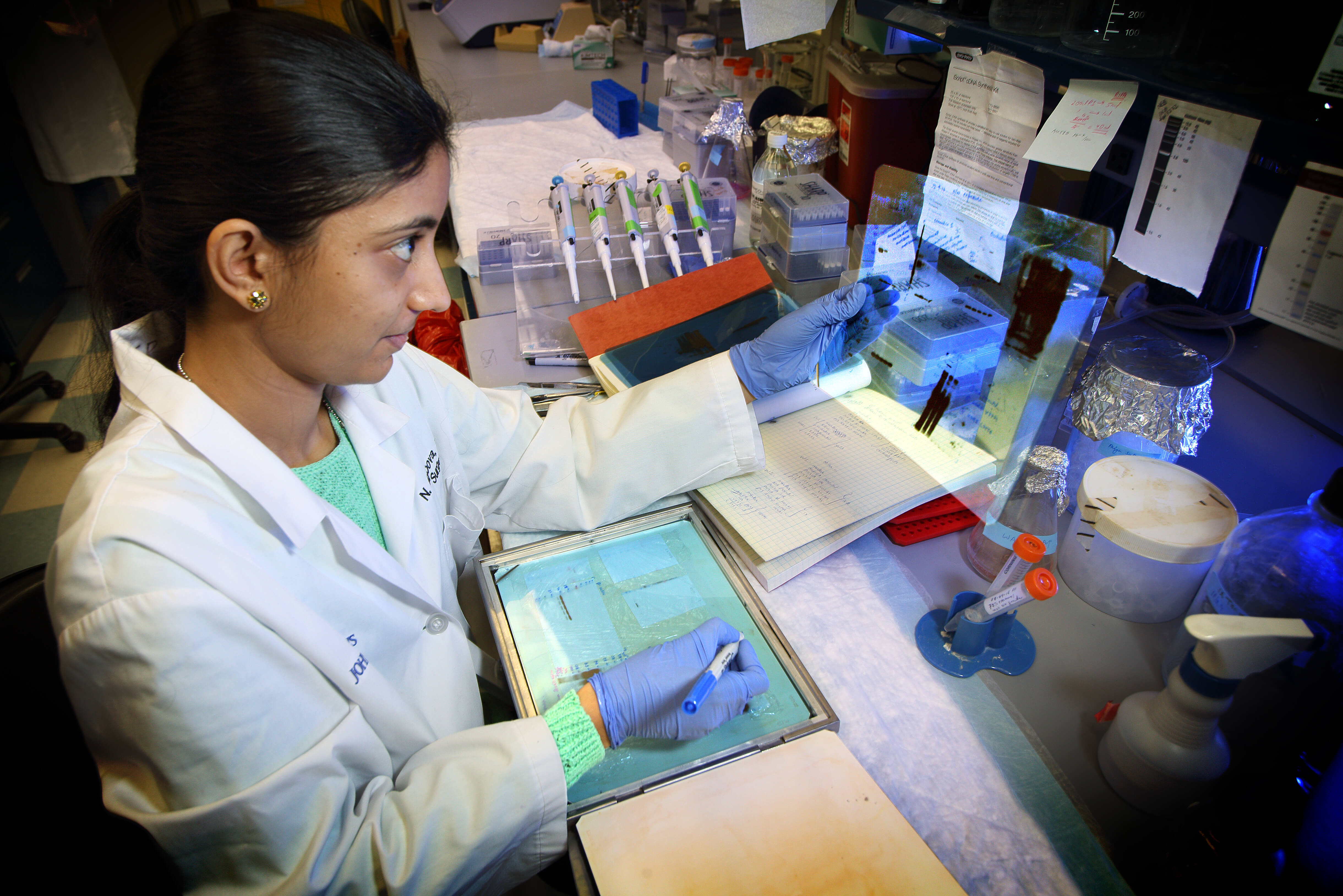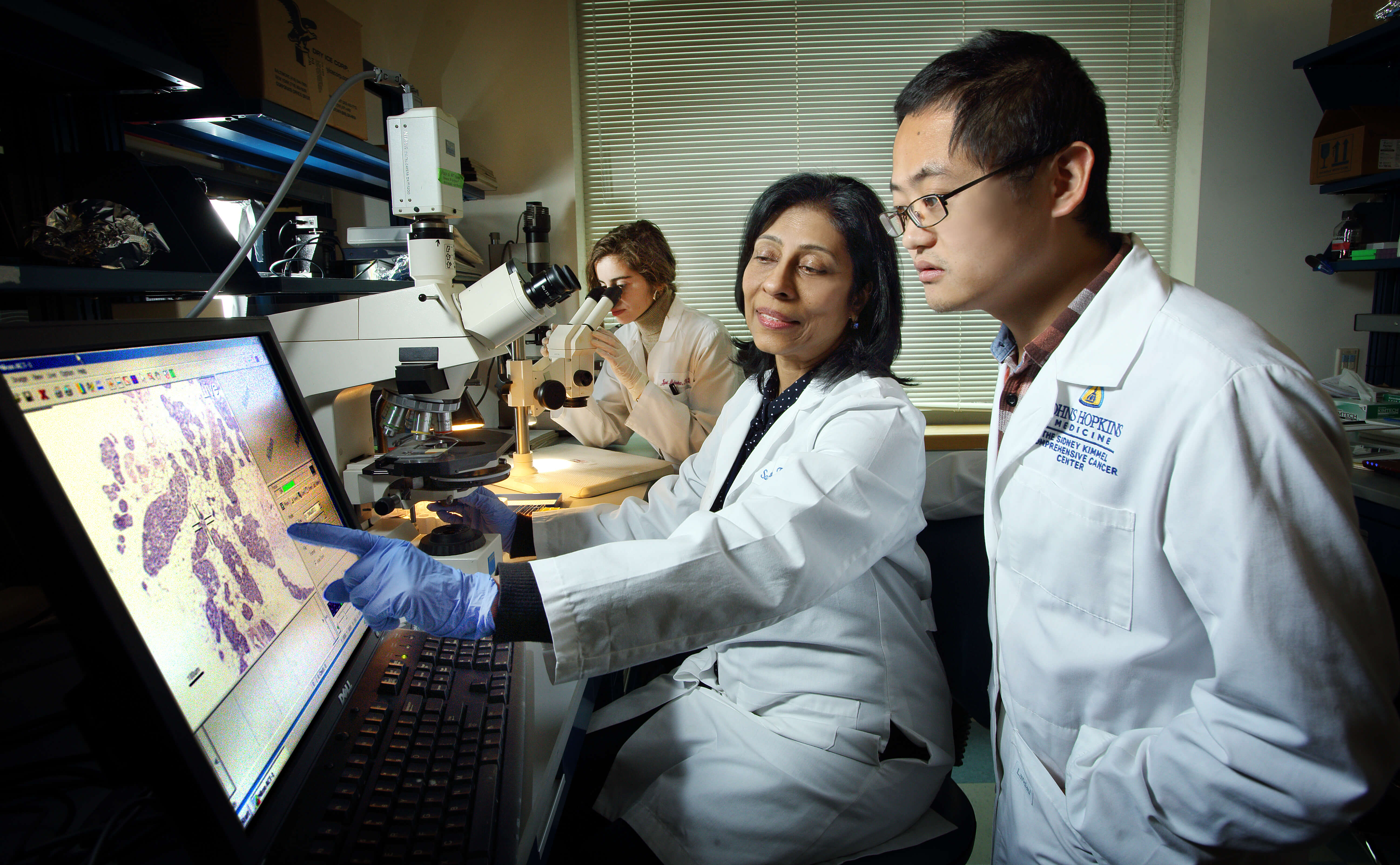Research & Clinical Trials
Our team at Johns Hopkins conducts research studies, also called clinical trials, to try to improve the care of patients with breast cancer. Clinical trials have led to advances in the treatment of this disease that benefit patients today; therefore, we let our patients know of any clinical trials for which they may be eligible.
Neoadjuvant trials or preoperative trials are for patients who have been diagnosed with breast cancer but have not yet had surgery. Some of these trials add a new drug to the standard chemotherapy patients receive before surgery and some test new drugs by themselves.
Adjuvant trials are for patients after surgery. These trials seek to improve our current standard treatments so that more patients may be cured. They may add a new drug to standard hormone or chemotherapy treatment to reduce the risk of cancer returning or to decrease the side effects of treatment.
Other trials may also be available to you and could include blood tests, questionnaires, or other modalities to enhance quality of life.
Things to know:
- Before joining a trial, we will go over the informed consent documents discussing the goals, procedures, risks and benefits with you
- Some clinical trials also require extra costs, clinic visits, and tests to evaluate how you are doing
- You will work closely with a clinical trials nurse or coordinator who will monitor your progress closely
Most of today’s standard treatments were yesterday’s clinical trials. It is important to remember that participation in a clinical trial is voluntary, and your care will never be negatively affected should you decline to join a clinical trial.
- See current breast cancer clinical trials
Clinical Trials During and After Breast Cancer
Breast Cancer Medical Oncologist and Co-Director of the Johns Hopkins Breast Cancer Program Dr. Vered Stearns discusses the importance of clinical trials from diagnosis through survivorship, the way they shape medical care, regulatory and ethical practices in place to ensure patient safety, and how to find out about specific clinical trials in your area.
Research Discoveries Lead to More Individualized Precision Medicine
Cancer is very complex and Johns Hopkins has led the world in deciphering the cellular causes of cancer. Through national and international collaborations with our team of physician scientists across Johns Hopkins University, we continue to change the care path for breast cancer patients by exploring new technologies and developing the most exacting standards of care.
 Breast cancer researcher
Breast cancer researcher Groundbreaking discoveries led by our team at the Johns Hopkins Kimmel Cancer Center found that breast cancer is not just one disease but a number of diseases. Several breast cancers might look alike under the microscope, but genetically they are very different. Most breast cancers are caused by a series of changes in normal cells over time. These cellular alterations are red flags or biomarkers which can identify those at risk and can serve as targets for prevention.
Some examples of Breast Cancer Program research include:
Liquid Biopsy Research to Identify Hidden Cancer Cells
As we advance evidence-based treatment protocols for breast cancer, our team of experts work toward the cure of cancer through novel approaches such as liquid biopsies. This non-invasive blood test will be able to identify microscopic, or hidden, cancer cells within the blood. Through focused research, this knowledge could literally determine the future of cancer care. After each step of treatment, our team will be able to determine if there are any residual cancer cells still within the body. This knowledge will then determine next steps so cancer treatment decisions are based on a very personalized approach to care to better limit the short and long term side effects of treatment.
Engaging the Immune System to Fight Breast Cancer
Researchers in the Breast Cancer Program are studying new therapies that may help educate and awaken the immune system's response to breast cancer cells. Working with scientists across Johns Hopkins who are studying how cancer cells evade the immune system, our clinicians are conducting clinical trials to test new therapies aimed at the immune system. These include vaccines that may help immune system cells find breast cancer cells in the body and immunotherapy drugs that target molecules on breast cancer and immune cells.
Epigenetic Therapy Resets the Biological Clock on Breast Cancer Cells
Epigenetics is the term used to describe natural control mechanisms that influence gene expression. Cancer cells use these control mechanisms to survive and spread. Epigenetic therapies target these controls and have shown the ability to reset them to normal, resulting in the death of cancer cells. Breast Cancer Program researchers are studying whether epigenetic-targeted drugs may help overcome resistance to standard breast cancer treatments. They are testing these drugs in combination with other therapies, including immunotherapy drugs aimed at awakening the immune system's response to breast cancer cells.
Breast Cancer Clinical Trials Define Therapy Plans
 Breast cancer researchers
Breast cancer researchersClinical trials advance cancer research and are the only way to find safe and potentially more effective therapies to treat cancer. Patients who enroll in clinical trials have access to new treatments that may offer better results than current treatments. Through breast cancer specific clinical trial research at Johns Hopkins, we are defining individualized therapy plans based on specific breast cancer types and the degree of spread, or how far the cancer has spread from where it originated.

